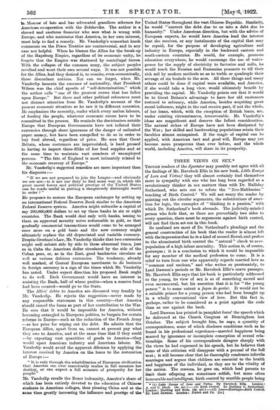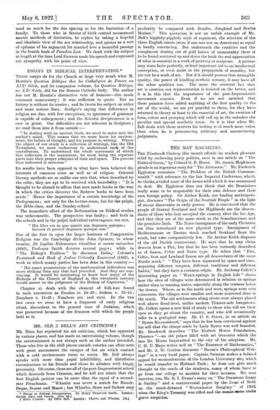THREE VIEWS ON SEX:* THOUGH readers of the Spectator may
possibly not agree with all the findings of Mr. Havelock Ellis in his new book, Lithe Essays of Love and Virtue,' they will almost certainly find themselves more, in sympathy with one who has long been regarded as a revolutionary thinker in sex matters than with Dr. Halliday Sutherland, who sets out to refute the " Neo-Malthusian " teaching of- Birth Control.' We will not weary the reader by pointing out the circular arguments, the substitutions of asser- tion for logic, the examples of " thinking in a passion," with which Dr. Sutherland's book abounds. The, judicially-minded person who feels that, as there are proverbially two sides to every question, there must be arguments against birth control, will not find them set out in this book.
So confused are most of Dr. Sutherland's pleadings and the general construction of his book that the -reader is almost left with the impression that he is akind of second-Herod, and prefers to the abominated birth -control the "natural " check to over- population of a high infant mortality. This notion is, of course, grotesque ; it is a conclusion to which it would be impossible for any member of the medical profession to come. It is a relief to turn from one who apparently regards married love as "common and unclean," and who writes so passionately, to Lord Dawson's periods or Mr. Havelock Ellis's suave passages. Mr. Havelock Ellis says that his book is particularly addressed to the young, its view of sex is as of something sacred and even sacramental, but his assertion that it is for " the young person " is to some extent a fawn de parley. It would not be a suitable primer for a young person who had been brought up in a wholly -conventional view of love. But this fact is, perhaps,- rather, to be considered as .a -point -against the code than as one against the book.
-Lord.Dawson has printed in pamphlet form' the speech which Ire delivered at the Church Congress at Birmingham last October. The subject brought him, he says, a quantity of correspondence, some of which discloses conditions such as he found in his professional experience—married happiness being marred by ignorance or incomplete conception of sexual rela- tionships. Some of his correspondents disagree sharply with the views he had expressed in his speech, but he believes that some of this -criticism will disappear• with a perusal of the full text ; it will become clear that he thoroughly condemns infertile marriages and argues that children are essential to the health and happiness of the individual, as they are to the 'vitality of the nation. The reasons, he goes on, which lead parents to limit their offspring are sometimes selfish, but more often honourable and intelligent, birth control-by sensible people being • (1),L4tee Boma of Lore and Virtue. By Havelock mile. London: A. and C. Black. Re. net.]—(2) Birth Control. By Halliday G. Sutherland. London: Harding and More. 16.. net.}-- (S) Loco—.3far/$390-4347M 007111171. :By Isrd Damon. Leaden: litebet and Co. Us-1 used as much for the due spacing as for the limitation of a family. To those who in favour of birth control recommend ascetic methods of limitation, ho replies by taking a hopeful and idealistic view of the sex relationship, and quotes as a sort of epitome of his argument for married love a beautiful passage in the fourth book of Paradise Lost. We dealt with the subject at length at the time Lord Dawson made his speech and expressed our sympathy with his point of view.



































 Previous page
Previous page